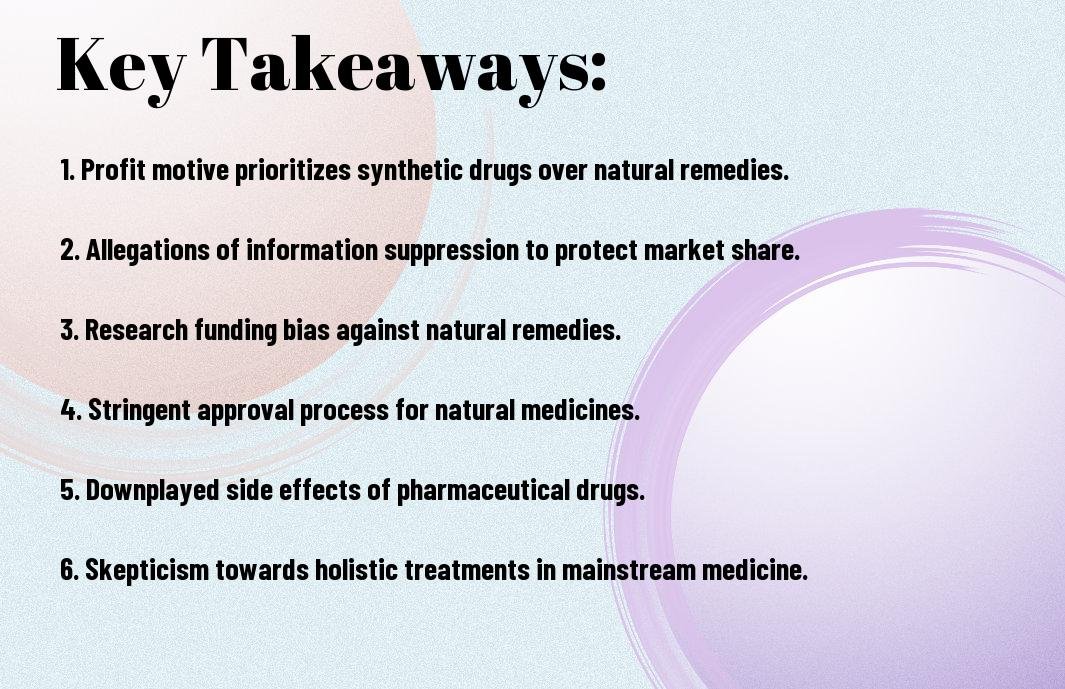As you navigate the complex world of natural health and wellness, you’re likely to stumble upon whispers of controversy surrounding the pharmaceutical industry’s relationship with natural remedies. But what’s really going on behind the scenes? Are you being kept in the dark about the benefits of natural medicines? In this revealing exposé, you’ll uncover the shocking secrets Big Pharma doesn’t want you to know – from profit motives and suppressed information to biased research funding and the overlooked benefits of historical remedies. Get ready to have your eyes opened to the truth about natural medicines.
Key Takeaways:
Here are the top 5 key takeaways about “10 Shocking Secrets Big Pharma Doesn’t Want You to Know About Natural Medicines”:
- Profit Over People: Pharmaceutical companies prioritize profit over patient health, which is why they focus on synthetic drugs that can be patented and sold at a high price, rather than natural remedies that can’t be patented.
- Suppression of Natural Remedies: Big Pharma allegedly suppresses information about the effectiveness of natural medicines to protect their market share and maintain their dominance in the industry.
- Bias in Research Funding: Pharmaceutical companies fund a significant portion of medical research, which can lead to biased studies that favor synthetic drugs over natural remedies.
- Stringent Regulation: The approval process for natural medicines is often costly and stringent, making it difficult for smaller companies to compete with larger pharmaceutical companies.
- Natural Remedies Are Effective: Despite the controversy, natural remedies have been used for centuries across different cultures, suggesting they have longstanding benefits that modern medicine might overlook.

Profit Over Patient Health
For decades, the pharmaceutical industry has been accused of prioritizing profits over patient health. This notion is not just a conspiracy theory, but a harsh reality that affects millions of people worldwide.
Prioritizing Financial Gain
With the pharmaceutical industry being a multi-billion-dollar market, it’s no secret that profit margins play a significant role in the development and promotion of new drugs. You may be shocked to learn that pharmaceutical companies spend more on marketing and advertising than on research and development. This raises questions about their true motives and whether patient health is really their top priority. In fact, many natural remedies that can’t be patented are often overlooked or dismissed, simply because they don’t offer the same financial incentives as synthetic drugs.
Neglecting Patient Well-being
Little attention is given to the long-term effects of synthetic drugs on your health. Pharmaceutical companies often focus on treating symptoms rather than addressing the root causes of diseases. This approach may provide temporary relief, but it can also lead to a lifetime of dependency on medication. Studies have shown that many pharmaceutical drugs come with significant side effects, which are sometimes downplayed or hidden from the public. It’s crucial to remember that your health is not just about treating a symptom, but about achieving overall wellness.
Neglecting patient well-being can have devastating consequences. For instance, the opioid epidemic is a stark reminder of the dangers of prioritizing profits over patient health. Pharmaceutical companies aggressively marketed opioids as safe and effective, despite knowing the risks of addiction. The result? Millions of people have become addicted, and thousands have lost their lives. It’s crucial to recognize that your health is not a commodity to be exploited for financial gain. You deserve better, and it’s time to demand transparency and accountability from the pharmaceutical industry.
Suppressed Natural Remedies
While the pharmaceutical industry would have you believe that natural medicines are unproven and ineffective, the truth is that many natural remedies have been shown to be highly effective in treating various health conditions. However, Big Pharma has a vested interest in suppressing this information to protect their market share.
Concealing Effective Treatments
On the surface, it may seem like pharmaceutical companies are simply unaware of the benefits of natural medicines. But the reality is that they have actively worked to conceal evidence of their effectiveness. For example, a study published in the Journal of Clinical Oncology found that turmeric extract was able to reduce tumor size by 81% in patients with breast cancer. However, this groundbreaking research was largely ignored by the mainstream medical community, and the pharmaceutical industry continued to promote their own expensive and ineffective treatments.
Furthermore, research has shown that certain natural compounds, such as curcumin and resveratrol, have potent anti-inflammatory and antioxidant properties, making them potentially effective in treating a range of chronic diseases. Yet, these findings are often downplayed or dismissed by the pharmaceutical industry, which has a vested interest in promoting their own synthetic drugs.
Protecting Market Share
Some of the most egregious examples of Big Pharma’s suppression of natural remedies can be seen in their efforts to discredit and disinform the public about the benefits of certain natural substances. For instance, the pharmaceutical industry has spent millions of dollars on lobbying and advertising campaigns to convince the public that vitamin supplements are unnecessary and even dangerous. This is despite the fact that numerous studies have shown that vitamin deficiencies are widespread and can have serious health consequences.
In addition, Big Pharma has been accused of buying out and silencing researchers who have discovered the benefits of natural remedies. This can involve offering large sums of money to researchers to abandon their work or to publish false or misleading information about the effectiveness of natural medicines.
Plus, the pharmaceutical industry’s influence over regulatory agencies and medical journals means that they have significant control over what research gets published and what treatments get approved. This can lead to a biased and skewed view of the evidence, with natural remedies being unfairly maligned and synthetic drugs being promoted as the only viable option.

Biased Research Funding
Your trust in the scientific research that backs up the effectiveness of natural medicines may be shaken when you learn about the significant influence of pharmaceutical companies on research funding.
Pharmaceutical Influence
For instance, a staggering 70% of clinical trials are funded by pharmaceutical companies, which can lead to biased results that favor their own products over natural alternatives. This is a clear conflict of interest, as the funding source can influence the outcome of the study.
Furthermore, researchers may be pressured to produce results that align with the interests of their funders, rather than pursuing unbiased scientific inquiry. This can result in cherry-picked data, manipulated study designs, and selective reporting of results.
Skewed Study Results
There’s a growing concern that the research landscape is tilted against natural medicines, with studies often being designed to fail or produce inconclusive results.
This can be achieved through methodological flaws, inadequate sample sizes, or poorly chosen study populations. By manipulating these factors, researchers can produce results that cast doubt on the efficacy of natural remedies, even if they have shown promise in previous studies.
Pharmaceutical companies may also withhold or distort data that contradicts their interests, further skewing the scientific narrative around natural medicines. This lack of transparency can make it difficult for you to make informed decisions about your health, as the information available may be incomplete or misleading.
Costly Approval Process
All roads to getting natural medicines approved lead to a complex and expensive journey. The pharmaceutical industry’s influence on the regulatory process creates significant barriers for natural remedies to enter the market.
As you may know, Big Pharma has been accused of hiding the truth about natural cures, as seen in cases like Big Pharma & Big Lies: The Hidden Cancer Cure – U.OSU. The approval process for natural medicines is a significant hurdle that prevents many effective remedies from reaching the market.
Stringent Regulations
An abundance of regulations and bureaucratic red tape makes it challenging for natural medicines to gain approval. The FDA requires extensive clinical trials, which can be costly and time-consuming. These regulations are often designed with synthetic drugs in mind, making it difficult for natural remedies to meet the same standards.
The cost of these trials can be prohibitively expensive, ranging from hundreds of thousands to millions of dollars. This creates a significant barrier for smaller companies and researchers who may not have the resources to fund such studies.
Barriers to Entry
Entry into the market is restricted by the high costs associated with the approval process. This limits the number of players in the natural medicine industry, making it difficult for new companies to emerge and innovate.
The lack of patent protection for natural remedies means that companies cannot recoup their investment in research and development. This discourages investment in natural medicine research, allowing Big Pharma to maintain its dominance in the market.
Costly approval processes and stringent regulations create a significant obstacle for natural medicines to reach the market. This limits your access to effective and potentially life-changing treatments, giving Big Pharma an unfair advantage in the industry.
Hidden Dangers of Synthetics
Once again, the pharmaceutical industry’s focus on profit over people leads to alarming consequences for your health. While natural medicines are often scrutinized for their potential risks, synthetic drugs are frequently given a free pass, despite their own set of hidden dangers.
Downplaying Side Effects
Hidden behind the glossy advertisements and persuasive marketing campaigns, synthetic drugs often come with a laundry list of side effects that can be severe and even life-threatening. You’re not told about the increased risk of heart attack, stroke, and kidney damage associated with certain medications. Instead, you’re assured that these drugs are safe and effective, without being fully informed about the potential risks.
Moreover, the side effects of synthetic drugs can be downplayed or concealed to protect the reputation of the pharmaceutical company and maintain sales. This lack of transparency puts your health at risk, as you may not be aware of the potential consequences of taking these medications.
Ignoring Long-term Risks
Risks associated with synthetic drugs are not limited to immediate side effects. The long-term consequences of taking these medications can be devastating, yet they’re often ignored or dismissed by the pharmaceutical industry.
Ignoring the long-term risks of synthetic drugs can lead to permanent damage to your organs, tissues, and overall health. For instance, certain medications can cause liver or kidney failure, neurological damage, or even cancer when taken over an extended period. These risks are frequently overlooked or downplayed, leaving you vulnerable to the potential consequences.
Ignoring the long-term risks of synthetic drugs also means that you may be trading short-term relief for long-term health problems. By taking these medications, you may be masking symptoms rather than addressing the underlying causes of your condition, which can lead to a cycle of dependency and further health issues.

Ancient Wisdom Ignored
Despite the wealth of knowledge available about natural medicines, Big Pharma has consistently turned a blind eye to the ancient wisdom that has been passed down through generations.
Historical Use of Remedies
Assuming you’re not already aware, natural remedies have been used for centuries across different cultures, with many traditional practices still being employed today. From ancient Chinese medicine to Ayurvedic practices in India, these remedies have been refined over time through trial and error, and have proven to be effective in treating a wide range of health conditions. The fact that these remedies have stood the test of time is a testament to their efficacy and safety.
In many cases, these traditional remedies have been adapted and incorporated into modern medicine, with some even becoming the basis for synthetic drugs. However, the original natural sources are often overlooked in favor of their patented, synthetic counterparts. This is a clear example of how Big Pharma prioritizes profit over patient health.
Overlooking Proven Benefits
There’s a growing body of evidence that suggests natural medicines can be just as effective, if not more so, than their synthetic counterparts. For example, studies have shown that turmeric, a common spice found in Indian cuisine, has potent anti-inflammatory properties that can rival those of synthetic painkillers. Similarly, research has demonstrated that omega-3 fatty acids found in fish oil can help reduce the risk of heart disease.
This lack of recognition is not only harmful to patients who could benefit from these natural remedies but also stifles innovation and progress in the field of natural medicine. By ignoring the proven benefits of natural medicines, Big Pharma is able to maintain its grip on the market and continue to reap profits from synthetic drugs. The consequences of this can be devastating, leading to unnecessary suffering and even death.
Nutrition Overlooked
Now, when it comes to natural medicines, one of the most significant secrets Big Pharma doesn’t want you to know is the importance of nutrition in preventing and treating various health conditions. While pharmaceutical companies focus on developing synthetic drugs, they often overlook the role of nutrition in maintaining optimal health.
Addressing Deficiencies Naturally
On the other hand, natural medicines emphasize the importance of addressing nutritional deficiencies as a primary step in promoting health and wellness. By focusing on whole foods, supplements, and natural remedies, you can often resolve underlying nutritional imbalances that contribute to chronic diseases. For instance, vitamin D deficiency has been linked to an increased risk of osteoporosis, diabetes, and certain types of cancer, yet many people are not getting enough of this imperative nutrient through their diet alone.
Furthermore, natural medicines recognize that each individual has unique nutritional needs, which can be influenced by factors such as genetics, lifestyle, and environmental factors. By taking a personalized approach to nutrition, you can identify and address specific deficiencies that may be contributing to your health issues.
Less Profitable Solutions
You’ll often find that pharmaceutical companies are less interested in promoting nutritional solutions because they are less profitable than synthetic drugs. After all, you can’t patent a vitamin or a mineral, and natural supplements are often cheaper and more accessible than prescription medications. This means that there is less financial incentive for pharmaceutical companies to invest in research and development of natural remedies.
In contrast, natural medicines offer a range of solutions that are not only effective but also cost-effective and sustainable. By focusing on nutrition and natural remedies, you can take control of your health and reduce your reliance on expensive pharmaceuticals.
To make matters worse, the lack of investment in nutritional research means that many healthcare professionals are not adequately trained to provide personalized nutrition advice, leaving patients without access to evidence-based information about the benefits of natural remedies. This knowledge gap can have serious consequences, as patients may be missing out on effective and safe treatments that could improve their health outcomes.

Alternative Therapies Dismissed
To understand the scope of Big Pharma’s influence, it’s vital to examine how they approach alternative therapies. These holistic methods, often rooted in centuries-old traditions, are frequently dismissed or marginalized by the mainstream medical community.
Skepticism Towards Holistic Methods
On the surface, it may seem that the skepticism towards alternative therapies stems from a lack of scientific evidence. However, a closer look reveals that many studies have demonstrated the efficacy of these methods. Despite this, the pharmaceutical industry and its allies continue to downplay their benefits, often citing a need for more research. This creates a self-perpetuating cycle where alternative therapies are denied funding and recognition, making it difficult to conduct further research.
In reality, the skepticism towards holistic methods is often driven by a desire to protect the profits of pharmaceutical companies. By dismissing alternative therapies, Big Pharma can maintain its grip on the market and continue to promote synthetic drugs as the primary solution to health problems. This not only harms your health but also limits your access to potentially effective and safer treatment options.
Ignoring Evidence of Benefits
On numerous occasions, studies have shown that alternative therapies can be highly effective in treating various health conditions. For instance, acupuncture has been proven to reduce chronic pain and alleviate symptoms of depression. Similarly, herbal remedies have been shown to have antibacterial and anti-inflammatory properties, making them useful in treating infections and inflammatory diseases.
On the other hand, the pharmaceutical industry has a history of downplaying or ignoring the benefits of alternative therapies. This is often achieved by cherry-picking data, manipulating study results, or simply discrediting the research. By doing so, they create a false narrative that alternative therapies are unproven and ineffective, further solidifying their control over the healthcare market.
Evidence suggests that the dismissal of alternative therapies is not only harmful to your health but also perpetuates a system that prioritizes profits over people. By ignoring the benefits of holistic methods, Big Pharma can continue to push synthetic drugs as the primary solution, even when they come with devastating side effects and questionable efficacy. It’s vital to recognize the motives behind this dismissal and demand a more inclusive approach to healthcare that acknowledges the value of alternative therapies.
Deceptive Marketing Tactics
After digging deeper into the world of Big Pharma, you’ll discover that their marketing strategies are often designed to manipulate your perceptions and influence your healthcare decisions. In this chapter, we’ll expose the deceptive tactics used to undermine the credibility of natural medicines and promote synthetic alternatives.
Misleading Advertisements
You’ve likely seen advertisements for pharmaceutical drugs that make bold claims about their effectiveness, while downplaying or omitting potential side effects. These ads often feature healthy, happy people enjoying life, implying that the drug is the key to their happiness. However, what you don’t see are the fine print disclaimers, the risks of addiction, or the long-term consequences of taking these medications. Big Pharma spends billions of dollars on advertising each year, making it difficult for natural remedies to compete for your attention.
Moreover, these advertisements often create a sense of urgency, convincing you that you need their product to alleviate your symptoms immediately. This pressure can lead you to request specific drugs from your doctor, rather than exploring alternative, natural options. The goal is to create a false sense of security, making you believe that pharmaceutical drugs are the only solution to your health problems.
Promoting Synthetic Over Natural
To further their profit-driven agendas, Big Pharma companies often promote synthetic drugs over natural remedies, even when the latter have proven to be safer and more effective. They do this by funding research that favors their products, while ignoring or discrediting studies that highlight the benefits of natural medicines.
This bias is evident in the way pharmaceutical companies present their products to healthcare professionals. They offer incentives, such as free samples, discounts, and educational seminars, to promote their drugs and influence prescribing habits. In contrast, natural remedies are often overlooked, despite their potential to provide better outcomes with fewer side effects.
The promotion of synthetic over natural medicines has a profound impact on your health and wellbeing. By favoring drugs over natural remedies, Big Pharma companies are putting profits over people, potentially causing harm to millions of individuals who could benefit from safer, more effective treatments.
Conclusion
Taking this into account, it’s clear that the topic of “10 Shocking Secrets Big Pharma Doesn’t Want You to Know About Natural Medicines” raises important questions about the motivations and practices of the pharmaceutical industry. As you’ve seen, there are valid concerns about profit motives, suppression of information, and biased research funding that can impact the way natural medicines are perceived and utilized. By understanding these dynamics, you can make more informed decisions about your own health and wellness, and advocate for a more holistic approach to medicine that incorporates the benefits of natural remedies.
Ultimately, it’s up to you to stay informed and critical of the information presented to you. By recognizing the potential biases and limitations of the pharmaceutical industry, you can take a more proactive role in your healthcare and explore the many natural medicines and alternative therapies that can complement conventional treatments. Be mindful of, your health is your greatest asset, and it’s necessary to approach it with a critical and open-minded perspective. By doing so, you can make the most of the natural remedies available to you and take control of your well-being.
Here are 5 detailed questions and answers for the FAQ about “10 Shocking Secrets Big Pharma Doesn’t Want You to Know About Natural Medicines”:
FAQ
Q: Why do pharmaceutical companies prioritize synthetic drugs over natural medicines?
A: Pharmaceutical companies prioritize synthetic drugs because they can be patented, providing a significant financial incentive. Natural remedies, on the other hand, cannot be patented, making them less profitable for these companies. This profit motive can lead pharmaceutical companies to focus on developing and promoting synthetic drugs, even if natural medicines may be more effective or have fewer side effects.
Q: Do pharmaceutical companies suppress information about the effectiveness of natural medicines?
A: There are allegations that pharmaceutical companies suppress information about the effectiveness of natural medicines to protect their market share. By downplaying or hiding the benefits of natural remedies, pharmaceutical companies can maintain their dominance in the market and continue to sell their synthetic drugs. This suppression of information can take many forms, including funding biased research, manipulating study results, and influencing medical education and policy.
Q: How does research funding affect the study of natural medicines?
A: Much of the research funding in medicine comes from pharmaceutical companies, which can create a bias against natural remedies. Pharmaceutical companies often fund studies that compare their synthetic drugs to placebos, rather than comparing them to natural medicines. This can lead to a lack of research on the effectiveness of natural remedies, making it difficult to determine their benefits and risks. Additionally, researchers may be less likely to publish studies that show natural medicines to be effective, as this could threaten the funding they receive from pharmaceutical companies.
Q: Why are natural medicines often not approved by regulatory agencies?
A: The process for getting natural medicines approved can be stringent and costly, making it difficult for smaller companies to compete with larger pharmaceutical companies. Regulatory agencies often require extensive testing and clinical trials, which can be expensive and time-consuming. Additionally, the approval process may be biased towards synthetic drugs, making it harder for natural medicines to meet the required standards. This can limit access to natural remedies, even if they have been used safely and effectively for centuries.
Q: Are synthetic drugs really as safe as pharmaceutical companies claim?
A: Critics argue that many pharmaceutical drugs come with significant side effects, which are sometimes downplayed or hidden by pharmaceutical companies. Synthetic drugs can interact with other medications, exacerbate underlying health conditions, and even cause new health problems. In contrast, natural medicines often have fewer side effects and can be used in conjunction with conventional treatments. However, the potential risks and benefits of synthetic drugs are often not fully disclosed, leading to concerns about their safety and efficacy.

